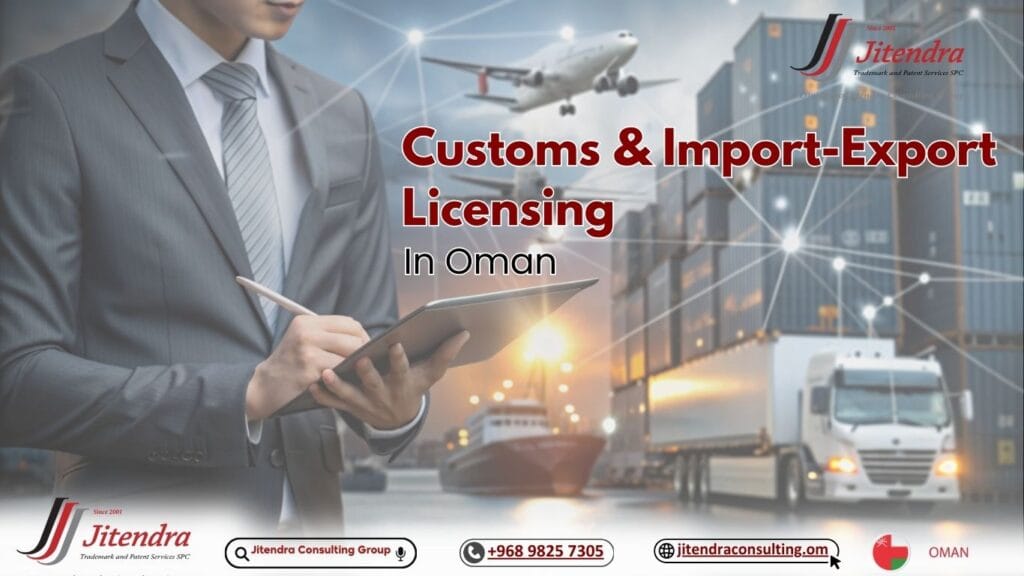Customs & Import-Export Licensing in Oman: Setup Advice for Trade-Focused SMEs
Are you planning to expand your small or medium-sized business into Oman’s trade market? Many entrepreneurs feel stuck due to confusing customs rules, lengthy paperwork, and unclear licensing procedures.
If you are one of them, you are not alone. SMEs often waste money and time when they try to handle these matters without proper advice. At Jitendra Consulting Group, we guide foreign investors and business owners with practical solutions to help them start smoothly and avoid common mistakes.
Customs Regulations In Oman
Oman has established strong trade links with global markets, and customs rules serve as the entry point for every business. For SMEs, customs clearance in Oman may look like a maze. Goods move in and out only when they meet specific classifications and tariff codes.
Since January 2025, the Harmonised System code has been extended from 8 digits to 12 digits, which makes product declaration stricter. For an SME owner, this means more accuracy is needed while filing. A wrong entry can delay your cargo at the port and increase costs.
The country is also actively working to tighten compliance. For example, starting September 1, 2025, Oman requires a Professional Practice Licence for certain logistics jobs. This includes food delivery riders, refrigerated truck drivers, and waste transport workers. Both locals and expatriates must hold this licence before they get a work permit or renew an old one. This shows how the authorities are serious about better regulation in the trade chain. For SMEs depending on logistics support, ignoring such updates can disrupt the entire supply process.
Import-Export Licensing Requirements In Oman
Every SME planning to trade must hold an import export license in Oman. Without it, you cannot clear shipments or open international trade contracts. Many business owners keep asking how to get an import export license in Oman. The process is clear but not always simple. You need approvals from the Ministry of Commerce, Industry, and Investment Promotion along with customs registration. Documentation, capital requirements, and location of the business all matter.
The cost depends on your activity type, but what matters more is the time. If you are new, delays often happen because papers are incomplete or not filed in the right order. This is where consulting experts save time. A professional consultant also makes sure your license fits your business model, so you do not pay for approvals you do not even use.
Setting Up A Trade-Focused SME In Oman
Starting a company in Oman has several paths. Some prefer a mainland licence, while others choose a free zone setup. Free zones like Sohar, Duqm, and Salalah give trade-friendly benefits such as tax exemptions and easy import procedures. A trade license for SMEs in Oman is often cheaper compared with large firms, but it still requires proper paperwork and legal clarity.
Foreign entrepreneurs also benefit from the government’s effort to simplify business setup for SMEs in Oman. Still, challenges remain. Office space, bank accounts, and sponsor requirements sometimes delay the process. Clear planning from day one reduces such risks.
Compliance And Legal Duties For SMEs
Running a trading SME is not only about buying and selling. Omani customs and trade compliance make it compulsory to follow local standards, safety rules, and tax laws. Non-compliance can mean fines, delays, or even suspension of the licence. To stay safe, SMEs must keep track of:
- Customs duties and tariffs that change with product type.
- VAT obligations on goods and services.
- Work permits and professional licences for logistics staff.
- Renewals of company and trade licences on time.
These duties may feel heavy for a small company but ignoring them can stop growth completely.
Opportunities For SMEs In Oman’s Trade Sector
Oman is pushing to become a trade hub in the Gulf. This opens strong opportunities for SMEs. Free zones reduce costs, and simplified licensing encourages foreign investment. The Golden Residency programme also allows investors to stay long-term if they meet the entry rules. For corporates and SMEs, this makes Oman not only a market but also a base for regional expansion.
Infrastructure is improving as well. Ports and airports are expanding. This allows smoother customs clearance in Oman and shorter delivery times. For an SME dealing with perishable goods, this means better chances to stay competitive.
Challenges And Solutions For SMEs Entering Oman’s Trade Market
SMEs often face issues like long licensing steps, unclear cost estimates, and a shortage of skilled staff.
Customs delays can also happen if product codes are not updated. The solution is to plan early, take expert support, and always match your activity with the correct trade licence. Many corporates already use professional advisors to handle Oman customs and trade compliance. SMEs can benefit in the same way without spending extra money.
How Jitendra Consulting Group Can Support SMEs
Jitendra Consulting Group is a business setup consultant in Oman with years of expertise in trade and licensing. We guide SMEs and corporates from the first step of business registration to securing the import export license in Oman. Our team also helps with customs clearance, compliance management, and renewal of licences. We make sure entrepreneurs do not face delays at ports or in government offices.
With expert advice and customised support, your SME can focus on growth while we handle the licensing and customs procedures.
If you plan to start or expand your business in Oman, contact us NOW!
Frequently Asked Questions (FAQs)
What are the conditions for import and export in the Sultanate of Oman?
To import and export in Oman, a company must hold a valid commercial license that includes import-export activities. It also requires registration with the customs system of the Royal Oman Police’s Directorate General of Customs and compliance with all regulations and requirements specific to the type of goods.
What goods are prohibited from being imported into the Sultanate of Oman?
There is a list of goods strictly prohibited from being imported into Oman for reasons related to security, public health, or morals. These items include narcotics, unlicensed firearms, pornographic materials, and counterfeit goods. Additionally, some items like medicines and food products are subject to strict control and require special approvals.
What is the customs law in the Sultanate of Oman?
The customs law in the Sultanate of Oman is the Unified Customs Law of the Gulf Cooperation Council (GCC) States. This law is the framework that governs all customs operations, including clearance, duties, and rules of origin. It aims to unify customs procedures and facilitate trade among the GCC states.
What are the requirements for customs clearance in Oman?
The basic customs clearance requirements in Oman include submitting the commercial invoice, bill of lading, certificate of origin, and the cargo manifest. These documents must be accurate and up-to-date. Some goods may also require additional documents such as health certificates or certificates of conformity.
What are the customs clearance companies in the Sultanate of Oman?
Customs clearance companies in the Sultanate of Oman are specialized and accredited firms and agents by Oman Customs. A list of these companies can be found on the official website of the Royal Oman Police. These companies act as an intermediary between importers/exporters and customs to facilitate and expedite the clearance process, ensuring compliance with all legal procedures.




